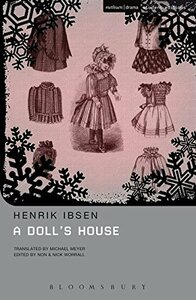Take a photo of a barcode or cover
challenging
emotional
inspiring
tense
medium-paced
Plot or Character Driven:
Character
Strong character development:
Yes
Loveable characters:
Yes
Diverse cast of characters:
Yes
Flaws of characters a main focus:
Complicated
challenging
emotional
informative
reflective
sad
medium-paced
Plot or Character Driven:
A mix
Strong character development:
Yes
Loveable characters:
Yes
Diverse cast of characters:
No
Flaws of characters a main focus:
Complicated
“Casa de muñecas” hace una crítica social ante las reglas del siglo XIX conforme a ambos géneros, principalmente, el papel que las mujeres debían desempeñar antes que ser humanas, debiendo mantener a su marido feliz y complacido, tanto que se perdían en los deseos ajenos que los propios; y claro, Nora, nuestra protagonista, no es la excepción.
Su vida es pintada como perfecta al ser acobijada bajo las alas de su esposo, la mujer resulta ser inexperta respecto a tener un trabajo, con una mente de niña soñadora se convierte en un juego, como las niñas jugando con sus muñecas, ella ha sido la diversión de sus seres amados de manera inconsciente.
Una venda difícil de quitar aún con sus manos, hasta que las cosas empiezan a enturbiarse y el cuchillo produce la herida más dolorosa que junto a la caída de tela, abre los ojos sobre deber buscarse a sí misma antes de seguir siendo una extraña en su mismo cuerpo y convivir con otro extraño.
Su vida es pintada como perfecta al ser acobijada bajo las alas de su esposo, la mujer resulta ser inexperta respecto a tener un trabajo, con una mente de niña soñadora se convierte en un juego, como las niñas jugando con sus muñecas, ella ha sido la diversión de sus seres amados de manera inconsciente.
Una venda difícil de quitar aún con sus manos, hasta que las cosas empiezan a enturbiarse y el cuchillo produce la herida más dolorosa que junto a la caída de tela, abre los ojos sobre deber buscarse a sí misma antes de seguir siendo una extraña en su mismo cuerpo y convivir con otro extraño.
dark
emotional
hopeful
inspiring
reflective
medium-paced
fast-paced
reflective
medium-paced
Plot or Character Driven:
Character
Strong character development:
Yes
Loveable characters:
No
Diverse cast of characters:
No
Flaws of characters a main focus:
Yes
Nora Helmer is such an important character to me that, before my husband and I decided we don't actually want children, back when we were still in the "maybe someday" mindset, we would talk about children's names and the only thing we agreed upon was that "Nora" would be a damn fine name for a daughter. To be fair, my husband hasn't actually read *A Doll's House (yet, I'm working on that) and probably liked the name because it sounds kind of Irish and because his favorite author, James Joyce, was married to a Nora, but for me it was all about the Nora of *A Doll's House,* the selfish, impractical, brave, silly, childlike, shrewd, impossible to really know Nora.
I don't actually think *A Doll's House* is a perfect play. I appreciate that it is the original example of realism. I like the basic plot structure and think some lines and sections are completely genius. I do think it can be a bit clunky at times- is it the translation, or the fact that verisimilitude is so much more important to 21st century art (thanks to Ibsen!), or the fact that we speak differently now than we did in the mid 1800s? Probably yes to all of the above, but the fact remains that the dialogue can feel a bit off at times, and that can be distracting. But to form such complex characters! To make someone as terrible as Torvald Helmer kind of a sympathetic character by the end, and to make someone as irresponsible and foolish and, again, selfish, as Nora into a true heroine? I'm not fool enough to criticize such a triumph of imagination and empathy.
I know that study which tried to link reading fiction to an increase in empathy couldn't be replicated, but I have done this play with my students three times now, and I can't help but notice the changes in their responses as they work through this text. They start with these knee-jerk reactions: Nora seems like a gold-digger, or she seems flighty, silly, stupid, annoying, etc. and Torvald seems yeah, maybe a little patronizing, but otherwise like a good enough dad and husband (or, sometimes, my more feminist students immediately identify Torvald as a creepy dad-husband and condemn him from the start for his "spendthrift" and "little squirrel" comments and the business with the macarons) and then, as we continue with the play, they find their opinions uncomfortably shifting, especially as we apply context to the situation and consider what would have become of Nora had she not decided to take the questionable actions she did in the years leading up to the play, were Torvald's decisions selfish, was he a product of his time, was Nora a product of her time, etc. I ask them to write a paper either completely defending or completely condemning one character, and the students think, at first, that this will be an easy assignment. After all, usually they have to come up with creative theories about the stories and poems we're reading, so this seems like a cinch- just come up with an opinion and defend it. Then they get down to it and they realize it's incredibly hard to talk about these characters in these black and white terms, and they get all squirmy about it- Nora is bad but like, maybe it's defensible? Torvald is a jerk but is it really his fault? Krogstad is whiny but like.... maybe he has a right to be kind of whiny? And so on. If you want your assumptions challenged, and if you don't like easy answers, and if you want to read about an original female anti-hero, here is your chance.
I don't actually think *A Doll's House* is a perfect play. I appreciate that it is the original example of realism. I like the basic plot structure and think some lines and sections are completely genius. I do think it can be a bit clunky at times- is it the translation, or the fact that verisimilitude is so much more important to 21st century art (thanks to Ibsen!), or the fact that we speak differently now than we did in the mid 1800s? Probably yes to all of the above, but the fact remains that the dialogue can feel a bit off at times, and that can be distracting. But to form such complex characters! To make someone as terrible as Torvald Helmer kind of a sympathetic character by the end, and to make someone as irresponsible and foolish and, again, selfish, as Nora into a true heroine? I'm not fool enough to criticize such a triumph of imagination and empathy.
I know that study which tried to link reading fiction to an increase in empathy couldn't be replicated, but I have done this play with my students three times now, and I can't help but notice the changes in their responses as they work through this text. They start with these knee-jerk reactions: Nora seems like a gold-digger, or she seems flighty, silly, stupid, annoying, etc. and Torvald seems yeah, maybe a little patronizing, but otherwise like a good enough dad and husband (or, sometimes, my more feminist students immediately identify Torvald as a creepy dad-husband and condemn him from the start for his "spendthrift" and "little squirrel" comments and the business with the macarons) and then, as we continue with the play, they find their opinions uncomfortably shifting, especially as we apply context to the situation and consider what would have become of Nora had she not decided to take the questionable actions she did in the years leading up to the play, were Torvald's decisions selfish, was he a product of his time, was Nora a product of her time, etc. I ask them to write a paper either completely defending or completely condemning one character, and the students think, at first, that this will be an easy assignment. After all, usually they have to come up with creative theories about the stories and poems we're reading, so this seems like a cinch- just come up with an opinion and defend it. Then they get down to it and they realize it's incredibly hard to talk about these characters in these black and white terms, and they get all squirmy about it- Nora is bad but like, maybe it's defensible? Torvald is a jerk but is it really his fault? Krogstad is whiny but like.... maybe he has a right to be kind of whiny? And so on. If you want your assumptions challenged, and if you don't like easy answers, and if you want to read about an original female anti-hero, here is your chance.
When I had to read this for school it was boring and a hindrance but after revisting the story it's nice, nothing amazing in my opinion.
challenging
emotional
mysterious
tense
fast-paced
Plot or Character Driven:
Character
Strong character development:
Yes
Loveable characters:
Yes
Diverse cast of characters:
No
Flaws of characters a main focus:
Yes
reflective
fast-paced
Plot or Character Driven:
Plot
Strong character development:
No
Loveable characters:
No
Diverse cast of characters:
No
Flaws of characters a main focus:
No






